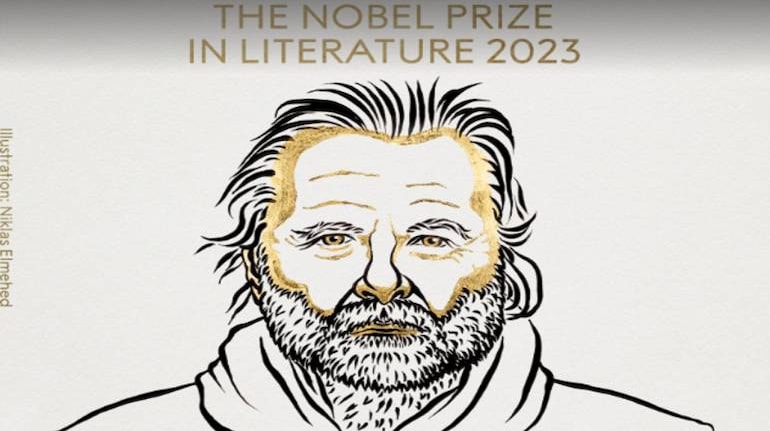



Norwegian author Jon Fosse has been awarded the 2023 Nobel Prize in Literature “for his innovative plays and prose which give voice to the unsayable”, the Swedish Academy announced on October 5. Fosse presents everyday situations that are instantly recognisable from our own lives, the academy said.
Born in 1959 on the Norwegian west coast, Fosse's immense œuvre is written in Norwegian Nynorsk and spans a variety of genres — plays, novels, poetry, essays, children’s books, and translations. Fosse got his breakthrough as a dramatist with the 1999 production of his play Nokon kjem til å komme (Someone Is Going to Come).
Fosse's magnum opus in prose is Septology which he completed in 2021: Det andre namnet (The Other Name, Eg er ein annan (I is Another) and Eit nytt namn (A New Name).
With its themes of fearful anticipation and crippling jealousy, Fosse’s singularity is fully evident, the academy said. “It is through Fosse’s ability to evoke man’s loss of orientation, and how this paradoxically can provide access to a deeper experience close to divinity, that he has come to be regarded as a major innovator in contemporary theatre,” it said.
“Jon Fosse – awarded the 2023 Nobel Prize in Literature – has much in common with his great precursor in Norwegian Nynorsk literature Tarjei Vesaas. Fosse combines strong local ties, both linguistic and geographic, with modernist artistic techniques. He includes in his Wahlverwandschaften such names as Samuel Beckett, Thomas Bernhard, and Georg Trakl.
“While Fosse shares the negative outlook of his predecessors, his particular gnostic vision cannot be said to result in a nihilistic contempt of the world. Indeed, there is great warmth and humour in his work, and a naïve vulnerability to his stark images of human experience.”
Talking about his style of writing, the Swedish Academy said Fosse writes novels heavily pared down to a style that has come to be known as ‘Fosse minimalism’.
“This can be seen in his second novel Stengd gitar (1985), when Fosse presents us with a harrowing variation on one of his major themes, the critical moment of irresolution. A young mother leaves her flat to throw rubbish down the chute but locks herself out, with her baby still inside. Needing to go and seek help, she is unable to do so since she cannot abandon her child. While she finds herself, in Kafkaesque terms, ‘before the law’, the difference is clear…”
According to Swedish industrialist Alfred Nobel's will, the Nobel Prize in Literature should be awarded “to the person who, in the field of literature, produced the most outstanding work in an idealistic direction”.
This year, the prize money to be awarded to the winner has been hiked to 11 million Swedish kronor from 10 million SEK.
Since 1901, when the Nobel Prizes were established, 119 noted litterateurs, only 17 of them women, have been awarded by the Swedish Academy.
French author Annie Ernaux, whose work provides an insight into life and society in modern-day France, won this prestigious award last year.
Six Nobel Prizes are awarded every year to recognise the contribution of stalwarts in the fields of Chemistry, Physics, Literature, Psychology or Medicine, Peace, and Economics.
Discover the latest Business News, Sensex, and Nifty updates. Obtain Personal Finance insights, tax queries, and expert opinions on Moneycontrol or download the Moneycontrol App to stay updated!